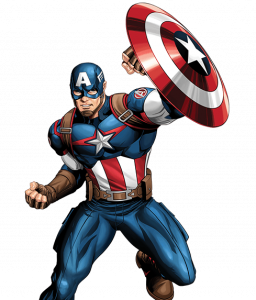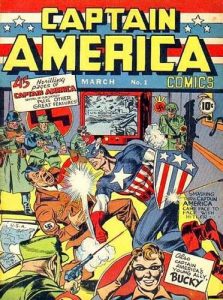This post is a sort of continuation of my last free inquiry post, so I would recommend reading that one first. If you have already read last week’s post, enjoy this sequel. This means it probably won’t be as good as last time but, we will still have fun anyway.
Not to be outdone by National Comics, Timely Comics created a superhero that eventually became an icon of the Second World War in comic books. Created by Jack Kirby (known for creating Kirby Dots to mimic energy in print) and Joe Simon, Captain America was introduced to the world in 1941. The pair created the imaginary Captain to inspire Americans to fight back against Nazi Germany, hoping that his embodiment of the States would drive their purpose into the hearts of the American people.

Before Captain America became a superhero, he was a scrawny army recruit named Steve Rogers. Rogers signed up for a superhero serum that transformed him into a super-soldier. During WWII, he fought against the Nazis and many other smaller comic book villains. Captain America’s main rival was the Red Skull, a Nazi spy and terrorist.

The original cover of Captain America #1. Cover date March 1941.
Due to the time in which Captain America was first released, the politics and the war had an effect on his character. The very first issue of Captain America saw the title character punching Hitler in the jaw. His patriotism is a defining character point, and his introduction shows the start of comic books (more specifically superheroes) reflecting modern politics.
Captain America’s storyline has always had ties to politics, in the 50s Cap briefly fought a war against communism. However, this period did not last long.
The best example of politics I could dig up from the Captain America comics was that of the Watergate scandal in the early 1970s. While Watergate was never mentioned by name in the comics, the Marvel Comic Universe created a similar event, where a high-level official in the US government was revealed to be working for an evil system. For a character like Steve Rogers, this event caused massive distrust in the American government. Which caused Steve Rogers to drop the mantle of Captain America in favour of Nomad, signalling that the world was not as black or white as he once saw it.
Politics and social justice are common themes in modern comics, as I will talk about in further blog posts. Thanks for reading! Come back next week when I will talk about women in comics!
Leave a Reply
You must be logged in to post a comment.